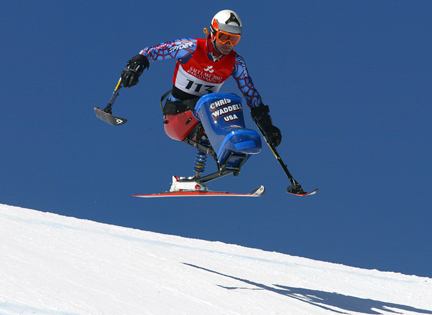Chris Waddell's motto is "It's not what happens to you. It's what you do with what happens to you," and he lives his words. Chris's story is one of extraordinary courage and heart. In 1988, while in college he broke his back in a skiing accident leaving him paralyzed from the waist down. Chris went on to become the most decorated male skier in Paralympics' history; winning 12 medals over four games. In 2009, Chris's historic climb up Mt. Kilimanjaro was documented in the movie, "1 Revolution." Nowadays, he devotes most of his time and energy to Nametags, his foundation that encourages people to challenge their assumptions and limitations that result from the labels that we give to others and ourselves. I recently spoke with Chris about his miraculous journey.

Suza: In your movie, "1 Revolution," you said that after you broke your back in the skiing accident that you didn't want to be labeled as disabled. How did you make the internal shift to accept and move on?
Chris:I had a conversation with my yoga instructor. I said, "I need to accept what's happened to me and be okay with it." She said, "Why do you feel like you need to accept this? It's just a change in direction." It was really comforting, because it took the emotional burden out of it, which was this idea of acceptance and mourning.
SS:Where did that lead you?
CW:To the idea, "It's not what happens to you. It's what you do with what happens to you," because I've done many things that I wouldn't have done otherwise. I'm not any different than I was ... the only difference is in how I get around. But in my essence, I'm not any different than I was before the accident.
SS:You embraced the new direction.
CW:I did. I think it's easy to stay stuck. It was more difficult for me to retire from competitive sports than it was to break my back, because my identity was tied to the success that I'd had as an athlete. The success can create a mask for us. It's a mask of safety, "Now, I'm okay. I'm safe in this world."
SS:How did you perceive your identity and what did it mean to you?
CW:My identity was as an athlete. You're turning yourself into a commodity, into something that's marketable both in the press and for sponsors. The identity becomes bigger than life, and is a two-dimensional thing. One of the most challenging parts of my identity as an athlete was being a world champion, because in the eyes of a lot of people I could do anything. When I retired I had to allow myself to be vulnerable, which is totally counter to the way I approached things when I left the hospital. I didn't want to be perceived as being vulnerable in any way. I wanted to be the exact opposite of vulnerable. But, if you're not vulnerable, then you never have a bad day; you never have worries; you never have all these things that are inherently human.
SS:Your own experiences and struggles with personal identity led you to create Nametags. What's the idea behind Nametags?
CW: Nametags is an educational program that focuses on breaking down the limiting ideas and labels that we have about others and ourselves. The ideas can be deep in our psyche and then in our minds they become a fact. It's like we have a glass ceiling for ourselves. Nametags addresses how do we go beyond it. We are inviting people to be more open with their perceptions about others and themselves--try to see things for the first time-- which is a real challenge because, especially as we get older, we get to the point where we keep making our world smaller and smaller. Let's get beyond the labels and actually see the individual.
SS:How do we go beyond our limiting ideas and labels?
CW:By seeing other people who refuse to acknowledge their glass ceiling, it opens a possibility for us to go beyond ours. We think, "He's doing it, and if he can do it, then I can do it." The other part of Nametags is the visibility piece and that is the glass wall separating us. We try to help people change their perspective so that they see themselves, the world and their place in it, differently.
SS:We all have the inner critic voice in our head, and if we believe those voices we limit ourselves.
CW:You have two choices in your life: to be a victim or not. Being a victim can prevent you from taking responsibility for your life and from doing what you might be good at, or what makes you unique, which is ultimately what you have to offer to society to make a better world.
